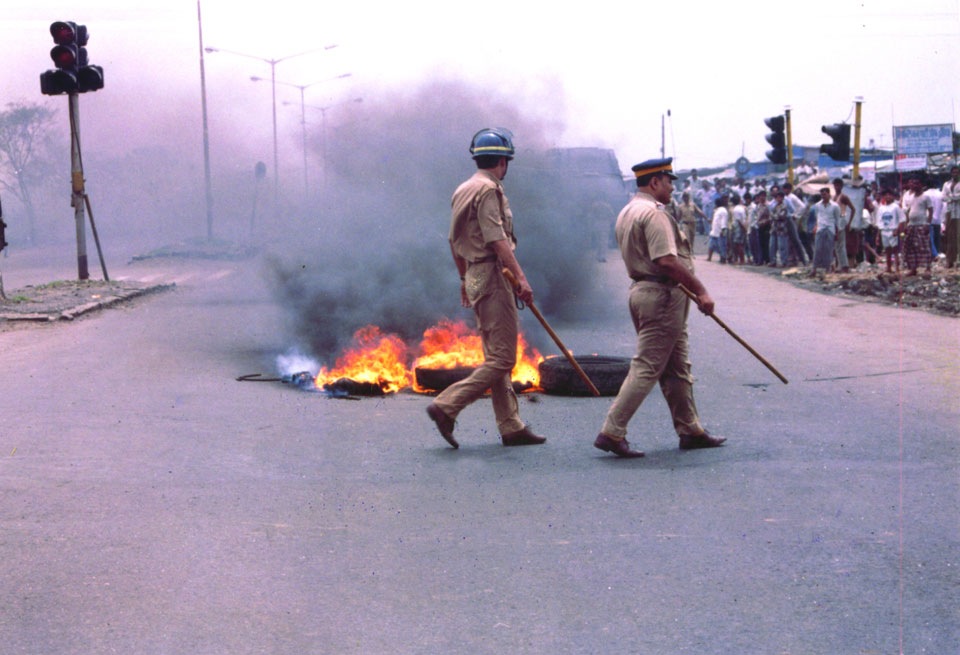
8 November 2013 20:00, Flagey Brussels.
Talk with Anand Patwardhan in the context of Filmer à Tout Prix, in collaboration with LUCA and INSAS. The talk will be preceded by a screening of Anand’s latest film ‘Jai Bhim Comrade’ (18:00).
“I would like my films to make a difference in the real world. I’m not content to make a film and let it sit idle or let it go only to some film festival or museum and be appreciated by a tiny fraction of well-to-do people. I want the films to be in the mainstream and do as much as I can to get into that mainstream, so that they have an impact in the real world.”
– Anand Patwardhan
Behind the images of an aspiring pluralistic democracy and a rising economic superpower, there exists an other India. One that is swept by continuous waves of religious and ethnic violence, more often than not abetted by the highest levels of government and law enforcement. One that is haunted by an acute rise in mass poverty and social inequality, to some extent still hinging on the enduring legacy of the caste system. One that is driven by a quest for militarism, steeped in a long history of Partition and nationalist militancy. This reality of India, a complex and painful entanglement of religion, ethnicity, warfare, gender and class, has been systematically neglected by most if not all traditional mass media, locally as well as internationally. One could say that countering this indifference is exactly what defines the value and politics of Anand Patwardhan’s documentary work: the commitment to report on the harrowing injustices that are left on the wayside of contemporary history, to oppose the hegemonic discourses and intervene in the debates raging through the political landscape. Moreover, in relentlessly focussing on the struggles that his own country is facing, his films do not only address local questions, but also stir up some of the key issues playing out in the world at large, notably problems of identity, community, racism and populism. And yet, the practice in which his films are inscribed is not the informative or investigative model of journalism, it is altogether something different: cinema. It is precisely through the aesthetics of cinema that Patwardhan accomplishes what is perhaps the essential politics of his work: the construction of a multifaceted world in which actions, gestures and words are displaced from their frame of common assumptions of condition and fate, and are given as possible tools of empowerment.
Filmer à Tout Prix will show two films by Anand Patwardhan: Bombay: Our City (1985) on 6 November 22:00 and Jai Bhim Comrade (2012) on 8 November 18:00 .
DISSENT ! is an initiative of Argos, Auguste Orts and Courtisane, in the framework of the research project “Figures of Dissent” (KASK/Hogent), with support of VG & VGC.
——————————————————————————————————————————————————————-
About DISSENT!
How can the relation between cinema and politics be thought today? Between a cinema of politics and a politics of cinema, between politics as subject and as practice, between form and content? From Vertov’s cinematographic communism to the Dardenne brothers’ social realism, from Straub-Huillet’s Brechtian dialectics to the aesthetic-emancipatory figures of Pedro Costa, from Guy Debord’s radical anti-cinema to the mainstream pamphlets of Oliver Stone, the quest for cinematographic representations of political resistance has taken many different forms and strategies over the course of a century. The multiple choices and pathways that have gradually been adopted, constantly clash with the relationship between theory and practice, representation and action, awareness and mobilization, experience and change. Is cinema today regaining some of its old forces and promises? Are we once again confronted with the questions that Serge Daney asked a few decades ago? As the French film critic wrote: “How can political statements be presented cinematographically? And how can they be made positive?”. These issues are central in a series of conversations in which contemporary perspectives on the relationship between cinema and politics are explored.